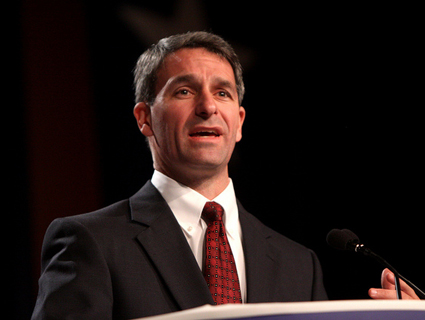
Virginia gubernatorial candidate Ken Cuccinelli<a href="http://www.flickr.com/photos/gageskidmore/6239102964/sizes/z/in/photolist-avk2WL-avhmZz-avhn4x-dcEP98-btg3Un-fFLC2Y-7Y82oS-btg1Tt-btg1uP-btg2Q8-e3YPrb-e3YQL5-e3YPAG-e3TcnR-e3Tdwr-e3Tc9g-e3YQtq-e3Tdfr-e3YP9N-dcENmv-dcEQrU-dcENLv-dcEPWE-dcEPdH-dcENZ2-dcEREQ-dcERgq-dcEPUQ-dcENhT-dcERPm-dcEQxA-dcERJh-dcEQFC-dcEQSS-dcEQky-dcENer-dcER9o-dcER2E-dcERnd-dcENpX-dcEPZb-dcENJ6-dcENwB-dcEPKv-dcEPmz-dcEPTP-dcEP5Z-dcEQ2u-bmcoPV-7N52TC-7bNCUF/">Gage Skidmore</a>/Flickr
On Wednesday, the campaign of Republican Ken Cuccinelli, who is running for governor in Virginia, released a new TV ad hammering Democratic candidate Terry McAuliffe for investing in the fiber-optics company Global Crossing. When Global Crossing filed for bankruptcy in January 2002, hundreds of workers were laid off and many current and former employees saw their 401(k) accounts and severance pay packages wiped out. “Yet political insider and investor Terry McAuliffe cashed in,” Cuccinelli’s ad says. McAuliffe banked $8 million on an investment of $100,000.
The new ad features three former Global Crossing workers. Like last year’s powerful ads featuring middle-class workers talking about Mitt Romney’s business record, the ex-Global Crossing employees give the ad its emotional resonance. But here’s the catch: Two of the three employees tell Mother Jones that they were never told their words would be used in a political attack ad appearing in a state some 400 miles away.
Deb Goehring, one of three ex-employees who appear in Cuccinelli’s ad, says she received a call out of the blue this summer asking if she would appear in a documentary film about the human toll of the Global Crossing bankruptcy. She says she spoke with a film crew for an hour and a half at a nearby hotel and signed a waiver allowing the filmmakers to use her interview however they pleased.
The filmmakers asked Goehring several times about McAuliffe and the money he made off the company. “I said I don’t really know anything about Terry McAuliffe,” Goehring told Mother Jones. “He was not involved in day-to-day operations in any way that I saw. As far as I’m concerned, he was like me, a stockholder, and he was able to make money at it. More power to the man. Good for him.”
Goehring says she never recalls any mention of her interview being used for a political ad. She didn’t know her interview had been used by the Cuccinelli campaign until a Mother Jones reporter told her about it. “If I had known that’s what it was for, I never would’ve agreed to the interview,” she says. “I know nothing whatsoever about Terry McAuliffe, and I don’t have any feelings about him one way or the other.”
In the ad, Goehring describes being laid off in August 2001: “I got walked out and that was it. My career was over.” After viewing the ad, Goehring replied, “Wow, that was likely the only negative thing that I said in the entire hour-and-a-half interview. But, it’s true, I did get walked out and my career with GC was over. However, that has nothing whatsoever to do with [McAuliffe], as far as I know.”
Corey Darrow, another ex-Global Crossing employee in the ad, says McAuliffe’s name came up often in her own interview for the film crew that made the ad. “What do you think about [McAuliffe]?” Darrow recalls her interviewer asking. “‘What do you think about what he did?'”
When Global Crossing filed for bankruptcy in January 2002, its collapse was overshadowed by that of Enron, which had folded the month before. When the filmmaker approached Darrow, she recalls, he spoke of wanting to better publicize what happened at Global Crossing, and she agreed to speak with him this spring about her own experiences. Darrow says he identified himself as James Abushar.
Like Goehring, Darrow says Cuccinelli’s name never came up in any of her interactions with Abushar. Nor was Darrow ever told that her interview would be used in a political attack ad in Virginia. “I’m kinda glad I got my story out there. What’s it doing for me? I dunno,” she says. “But I wish I would’ve known where it was going to be shown and when.”
Gary Baron, the third ex-employee in the Cuccinelli ad, did not respond to requests for comment left at his home and office. Cuccinelli adviser Chris LaCivita and a spokeswoman for Cuccinelli’s campaign did not respond to requests for comment.
John Pusloskie, president of the Communications Workers of America chapter in Rochester, New York, says Abushar approached him this spring claiming he was an “independent journalist from Detroit” interested in making a documentary about the Global Crossing bankruptcy. He seemed convincing as a journalist, Pusloskie says, “so I spilled my guts to the guy.” Pusloskie also connected Abushar with the former president of a local union that represented workers of a company Global Crossing purchased and the current president of the union’s retiree club.
Pusloskie says he was furious and disgusted when he heard about the Cuccinelli ad. “I’m pretty pissed off that somebody comes in here saying he’s something, then taking advantage of people who are extremely hurt by the situation and using it for a political purpose,” he says. “And I feel terrible that I fricking referred him to the president of the retiree club, and that the guy befriended some guy that was already emotionally wounded by it.”
Abushar, Pusloskie says, “basically made a goddamn fool out of me.”
Contacted by phone, Abushar referred Mother Jones to “the people who did the ad.” He declined to say who those people were. “I didn’t do any ad,” he said. “You need to approach the folks who did that.” He did not respond to questions about his contacts with Goehring, Darrow, or Pusloskie, who all referenced him by name. He said he would call back with more information about the ad, but has yet to do so.













